*FYI - this post may contain affiliate links, which means we earn a commission at no extra cost to you if you purchase from them. Also, as an Amazon Associate I earn from qualifying purchases. Check out our Privacy Policy and Disclosure. for more info.
In light of recent events, travel communities have been abuzz with endless questions about more or less the same thing: “Is Morocco safe for tourists to visit anymore?” “Should I cancel my trip to Morocco?” and a whole lot of other sweaty, panicky, first-world-problemmy lines of inquiry.
… And I totally get it.
If you want to travel to Morocco, safety is of course a key concern that you should address. (Alongside what to pack and how many giant rugs your home really needs)
But comments like “MOROCCO IS A DANGEROUS COUNTRY AND THIS IS WHY I WILL NEVER TRAVEL THERE” or equally aggressive “THIS IS WHY YOU SHOULD NEVER TRAVEL IT’S NOT SAFE”? Yikes.
Save this post for later on Pinterest:
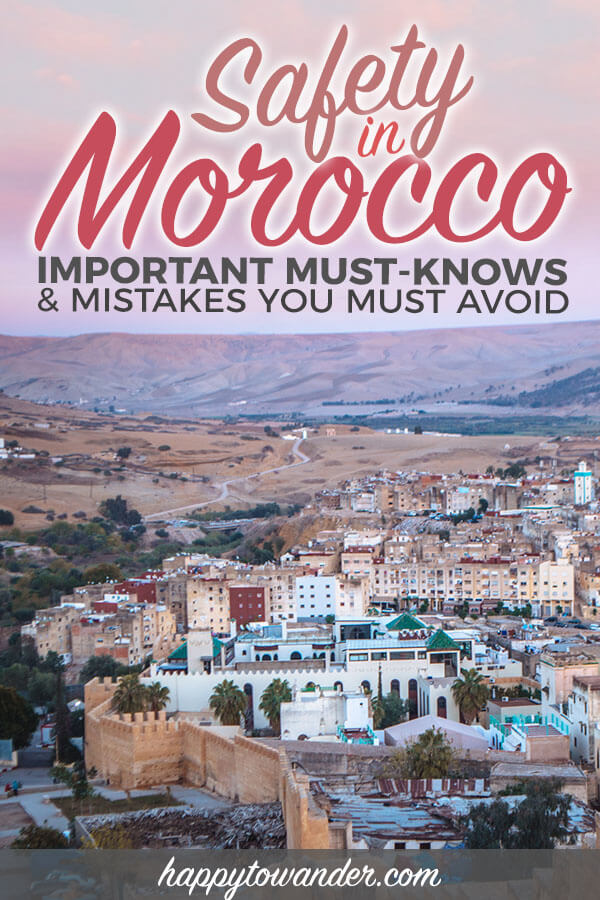
I find those sweeping statements not only harmful, but super upsetting because Morocco, in spite of recent safety scares, is a really beautiful country with a rich culture that I’d happily explore over and over.
BUT, and I say this with a big BUT, Morocco is not a country for the faint of heart. Unless you’re prepared for it, you might be sorely disappointed.
So that’s why this article will go in-depth into the safety of travel to Morocco, based on two experiences I’ve had both as a group of girls travelling to Morocco and as a couple. It’s a long one, so grab yourself a mint tea and snuggle up.
PS: For more travel in Morocco safety tips, be sure to read this article I wrote about important must-knows before you travel to Morocco as well.
Travelling to Morocco soon? You might also find these posts helpful…
A Guide on What to Wear in Morocco + a Free Packing List
18 Super Important Must-Knows Before You Travel to Morocco
The Glittering Magic of Morocco (in Photos)
1 Week in Morocco (Travel Diary)
Fes to Chefchaouen Day Trip Guide
Morocco Safety: General Overview
As I mentioned in the intro, I’ve been to Morocco twice, mainly flouncing around the hot tourist spots (Fes, Chefchaouen, Marrakesh, Essaouira and Ouzoud Falls).
I’ve never been to the desert or to smaller villages, but since the cities I’ve been to are the usual spots that people swarm to as first timers (thanks RyanAir!!!), I’m going to give you a run-down of what my experience has been in these places.
But first: remember that safety is a very subjective thing, and is influenced by a LOT of factors including your sex, sexuality, colour of your skin, etc.
As a straight, Asian, cis-female, I enjoy certain privileges when it comes to safety, but also face unique threats too.
With that in mind, here are some other perspectives and experiences from other travel bloggers, showing what it’s like to travel as a gay couple to Morocco, what it’s like to travel as a black woman in Morocco, and travelling around Morocco in a wheelchair.
Anyways, based on my own personal experience, here’s my honest opinion about safety in Morocco: as a tourist, I consider Morocco totally safe… you just need to be well equipped to handle it.
It’s really that simple!
Sure, any Google search about safety for tourists in Morocco will inevitably yield horror stories and negative reviews, but that’s just the nature of the Internet.
People will more readily take to the interwebs to complain than to praise… but you need to understand this: Morocco is built for a certain type of traveler… the kind of traveler that goes with the flow and more readily laughs things off than let it bother them.
If you don’t have thick skin when it comes to dealing with travel troubles, I think you’ll probably hate Morocco to be honest. It’s rather inevitable that you’ll get swindled (or at least someone will attempt to swindle you) at some point, and too often, people will let this ruin their trip.
If that sounds like something you’d be able to get over, then read on. I’m going to quickly run down my experience with different types of safety in Morocco, before giving you my top Morocco safety tips. First…
Crime in Morocco
Crime in Morocco (from my own personal experience) is more opportunistic and focused around petty crime and scams rather than outright violent crime.
This isn’t to say such crime doesn’t happen (I’ve heard of some armed robberies for instance), but as a female traveler in Morocco, I have never felt I was in physical danger.
Instead, any perceptions around a lack of safety stemmed from good ol’ fashioned paranoia, either that people were trying to scam us, or (to a lesser extent) that we might get sick from the food.
That said, crime in Morocco does exist.
Pickpocketing is common in crowded spaces (as it is in any touristy city), and I’ve heard of some “bag snatchings” from motorbikes as well, so do keep your belongings close to you at all times and think about investing in a slashproof anti-theft bag.
They’ve come a long way these days and can be really cute and functional:
Food Safety in Morocco
I’ve personally never gotten ill from eating anything in Morocco, and trust me, I eat enough for five families, so those are great odds.
BUT people of course do get sick – it’s kind of an inevitable consequence of travel.
The level of hygiene can vary a lot in Morocco depending on where you eat, but as a general rule of thumb, stick to cooked foods only and bottled water (some say tap is fine but I wouldn’t risk it) OR even better – bring along a steri-pen to treat water as an extra safety measure.
I’d also read reviews on food stuff beforehand – often that’ll give you a good indication on their cleanliness.
NOTE: As much as we can try to avoid getting ill from food, it tends to happen in a frustratingly unpredictable way.
For example, a friend of mine ate street food for a solid week in Morocco, then got food poisoning after a meal at the nicest, fanciest restaurant of her whole trip… so sadly, it’s not predictable, but I find that if you stick to the main cities and visit reputable restaurants or touristy areas, you’re fine.
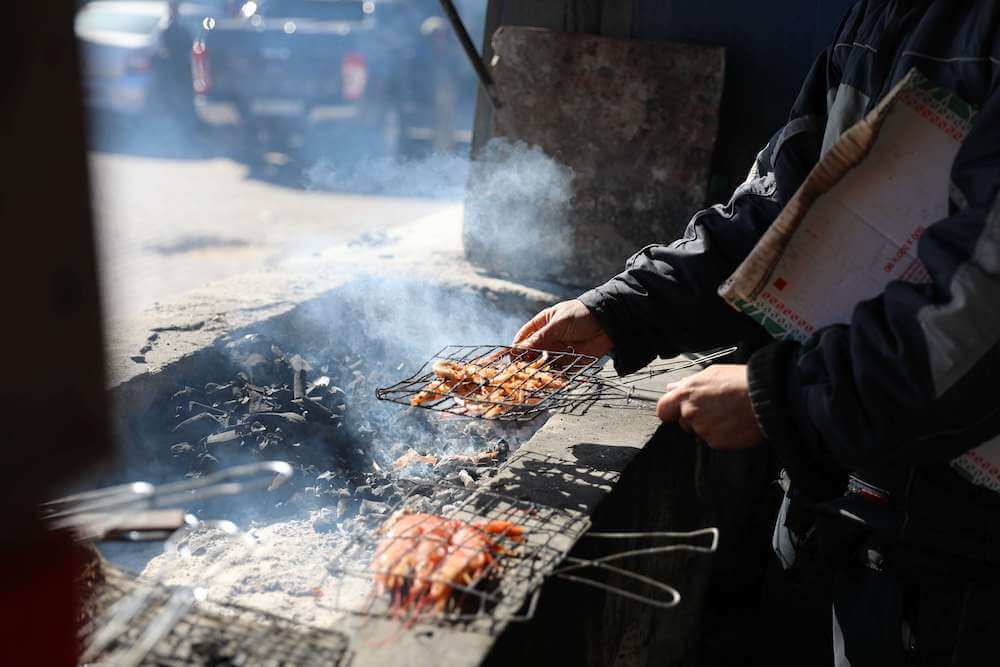
Road Safety in Morocco
One area that I have no experience in is driving in Morocco.
I’ve heard a few horror stories about getting pulled over and fined for very random reasons, or just about the general recklessness of Moroccan drivers.
I’ve also taken a few buses and know that the roads can be very bumpy.
All that said, driving is one of the most flexible and exciting ways you can explore Morocco, and I’ve heard of quite a few travellers doing this, so I know it’s possible.
If this sounds like your jam, my friend Nina wrote a great post about driving in Morocco which you can read here.
Terrorism and Civil Unrest in Morocco?
Lastly, because of recent events, people have become increasingly concerned about potential terrorist attacks in Morocco.
Unfortunately, this is a risk anywhere, even in some of the world’s most touristy cities like Paris or London. What I will say is that it is very very very uncommon, but the risk is up to you.
As with any place, there’s always some risk, but if we went by that, we’d all just stay at home, crying into our buckets of popcorn while watching reruns on the Travel Channel…
So, is summary: Morocco safe? I think it is, if you’re smart about the way you visit. Below you’ll find some of my handiest tips around safety in Morocco for visitors.
Safety in Morocco for Tourists: My Most Important Tips
To maximize your safety in Morocco, and to ensure that you have a thoroughly enjoyable and unspoiled time, here are some of my top Morocco safety tips.
These will hold true in many of the cities that are popular with tourists (Marrakech, Fez, and to a lesser extent, Essaouira and Chefchaouen for example).
Now, I know this is a long list, and it might make Morocco seem more scammy or dangerous than it is. Trust me, Morocco is great! It really is! I just want you to be prepared. *laughs nervously* really.
Anyways… let’s get to them tips.
1. Make it clear that you’re not a dumb tourist
This is my number 1 tip for safety in Morocco: make it evident to EVERYBODY (scammers, shopkeepers, hustlers, taxi drivers, etc.) that you’re a savvy tourist, and not a dumb one.
Really! The foundation of ALL the scams that happen in Morocco is the assumption that as a foreigner, you’re a walking ATM doofus and don’t know your right from your left in this foreign environment.
Inflated prices? You’ll get them because you don’t know the real prices. Fake tour guides? They’ll follow you because they think you can’t tell the difference.
So, what I’ve actually found is the BEST scammer-shield is to just make them aware that you know what they’re up to. It’s that easy.
Things like:
“I know the price you’re giving me is too high. This is my third day in the city and the other shopkeeper offered me x for the same product.”
“This is my 5th time in Morocco. I know the price of the taxi should only be x”
“I know that ____ isn’t closed yet. I have lived here for x years”
Etc. etc.
Emphasize that you know what they’re up to, and that basically this isn’t your first rodeo.
This is my top tip and it’s the best way to get scammers off your back.
As soon as they know you’re not just “another dumb tourist”, they’ll probably get off your back and peruse the hundreds of other dumb tourists who have just trickled in 😉
Related to this is you should dress appropriately (here’s a packing guide for Marrakech), and you should never look lost.
Walk with purpose, head held high, strutting your stuff through the mean streets of Morocco 😉
Trust me: looking like a lost kitten is a sure recipe for unsolicited help. If you need to stop and check a map, do it discretely, maybe duck into a shop or cafe.
This will minimize the amount of fake tour guides on your back.
2. Know that “La” means no in Arabic
While “no” is pretty universally understood, busting out the Arabic can make eager beavers disappear faster. LA LA LA.
If you want to be more polite, “la shukraan” is “no thank you”.
3. Be mindful of your surroundings and when crossing the street
Basic advice, but Moroccan cities are chaotic.
Even in the tiniest narrow streets, there are motorbikes whizzing by and trust me when I say they do NOT give a damn about tourists bumbling about.
I’ve heard of people getting knocked over by these bikes, only to have the driver whizz off without a care in the world… so remember, be mindful of your surroundings, get out of the way of vehicles and be very very careful when crossing the street.
FYI, in crowded spaces, pickpockets are also very common so be mindful of your belongings.
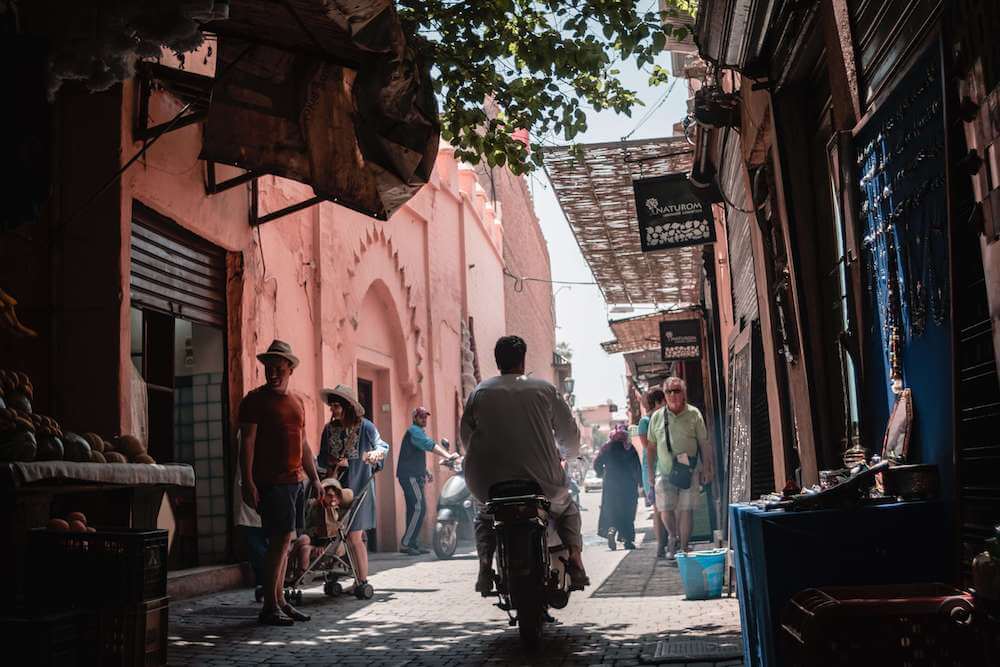
4. Remember: safety in numbers!
Even if you choose to visit Morocco solo, I highly advise you either book a tour, find a private guide or make friends at your hostel, riad, etc. that you go out and explore with.
This is especially true for female travelers.
I never explored solo during my time in Morocco, but even in instances when it was just me and a (female) friend, I felt much more intimidated by my surroundings vs. when I was in a group setting, certainly at night. On that note…
5. Don’t walk alone at night
This might be common sense, but particularly if you are staying in any maze-like parts of the city (think the medina of either Marrakech or Fes), you should avoid wandering around at night after everything has closed.
Not only is it harder to find your way around, this is prime time for a lot of “faux tour guides” to kind of lurk around, usually young men who ask you if you’re lost and try to lead you back to your hotel, demanding a fee at the end. And on that note, it’s important that you also…
6. Familiarize yourself with common Moroccan scams
Scams are as common in Morocco as fresh orange juice and glorious tagine comas.
Luckily, it’s the same scams that recur over and over, so if you are familiar with them, then you’re able to avoid them. I’ll detail some of the most common scams I’ve encountered down below.
7. Stick to the main streets
In pretty much every city there will be the big busier streets, even within the medinas.
I highly recommend you stay on these because you’ll at least be near other tourists and just people in general.
I’ve accidentally walked down “back alleys” a few times and it can be a little intimidating, certainly once in Essaouira when I was walking with a girlfriend of mine and this guy ran into a cafe to tell his buddies two honeys were walkin’ down the alley and literally a million men emerged from this tiny bar to stare us down. It was like ants coming out of an anthill, but pervy.
Yuck.
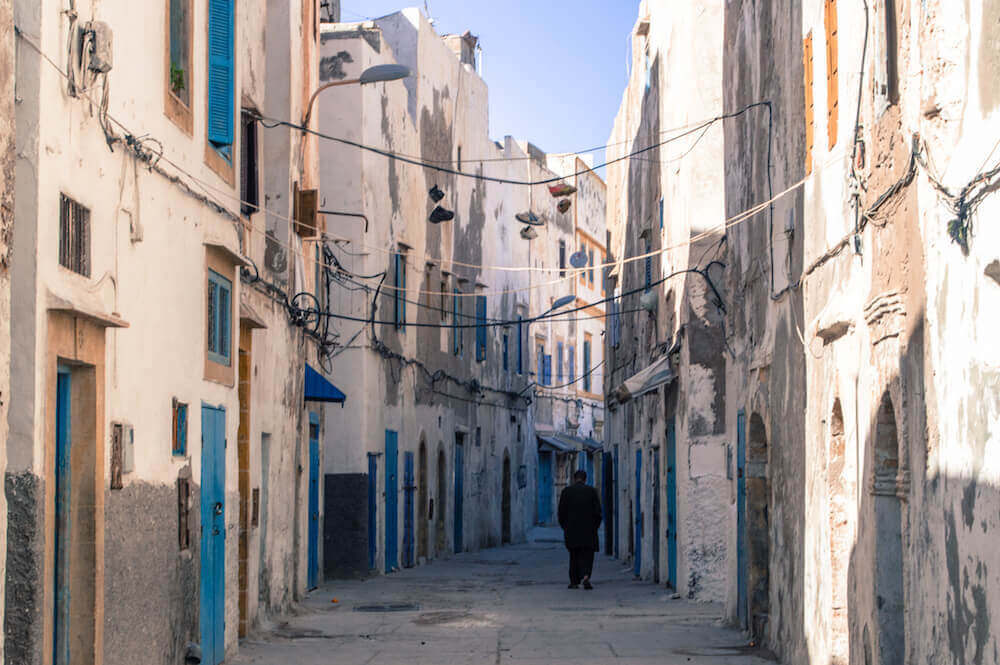
8. Don’t flaunt your wealth
I would leave any flashy jewelry, expensive watches, brand name clothes or bags, etc. at home.
This isn’t necessarily because someone might come yank it off you (which is possible) but it’s because appearing “rich” will make you a bigger target for any kind of scam.
In Morocco, even just saying you’re from Canada, the US, etc. will label you instantly as someone who has some dough to spend, which results in a higher likelihood of inflated prices, bait-and-switch scam tactics and more.
9. Avoid eye contact and ignore
If you do find yourself the victim of some kind of uncomfortable attention, whether that’s catcalling, overly aggressive shopkeepers or anyone else, I’ve found that it’s very rare they continue to pursue you even when you ignore them and avoid eye contact.
The worst thing you can do is give them any kind of attention, because even a “no” will invite further conversation.
The best thing to do in these instances (if you don’t want to be bothered) is to just avoid eye contact and keep walking. If they do happen to follow you, go for a firm “NO” or “LA (again, that’s no in Arabic).
PS: Sunglasses help with the whole avoiding eye contact thing too.
10. Negotiate prices for taxis beforehand, or get them to turn on the meter
Taxis are one of the easiest ways for you to get scammed in Morocco.
In sum, there are two types of taxis you can take in Morocco: the petit taxis (the small taxis), which fit 3 people max and the grands taxis (the big taxis) which can fit 6.
With grands taxis, rates vary and you pay per seat. The only advantage is they’re able to travel outside the city whereas petits taxis can’t. I’ve heard unanimously that you should take petits taxis whenever possible.
On that note, I’ve only ever taken the petit taxis, but with these ones, they are legally obligated to turn on the meter. Forcing them to do so will probably be the best way to ensure you don’t get scammed.
(Just make sure you have an idea on Google Maps of where you’re going so you can tell if they’re purposefully taking the wrong route to gauge you for more money).
Alternatively, you can agree on a fixed price BEFORE you get into the taxi.
If you’re getting a taxi from the airport, look for a big sign at the taxi stand with fixed prices and insist they stick to that OR save yourself the stress upon arrival and book a 5* shuttle transfer from the airport. It’s relatively inexpensive and you pay for ease of mind. Check out the options here.
A few additional notes:
Make sure you have small coins and exact change. Often they will pretend they don’t have the change you need so they can keep extra cash.
Check with your riad or hotel what a fair taxi rate would be to get there from main spots like the airport, central square, etc. so you have a rough idea of how much a set price should be
French is very helpful for conversing with taxi drivers – many are more comfortable with French than English. The meter in French is “le Compteur”.
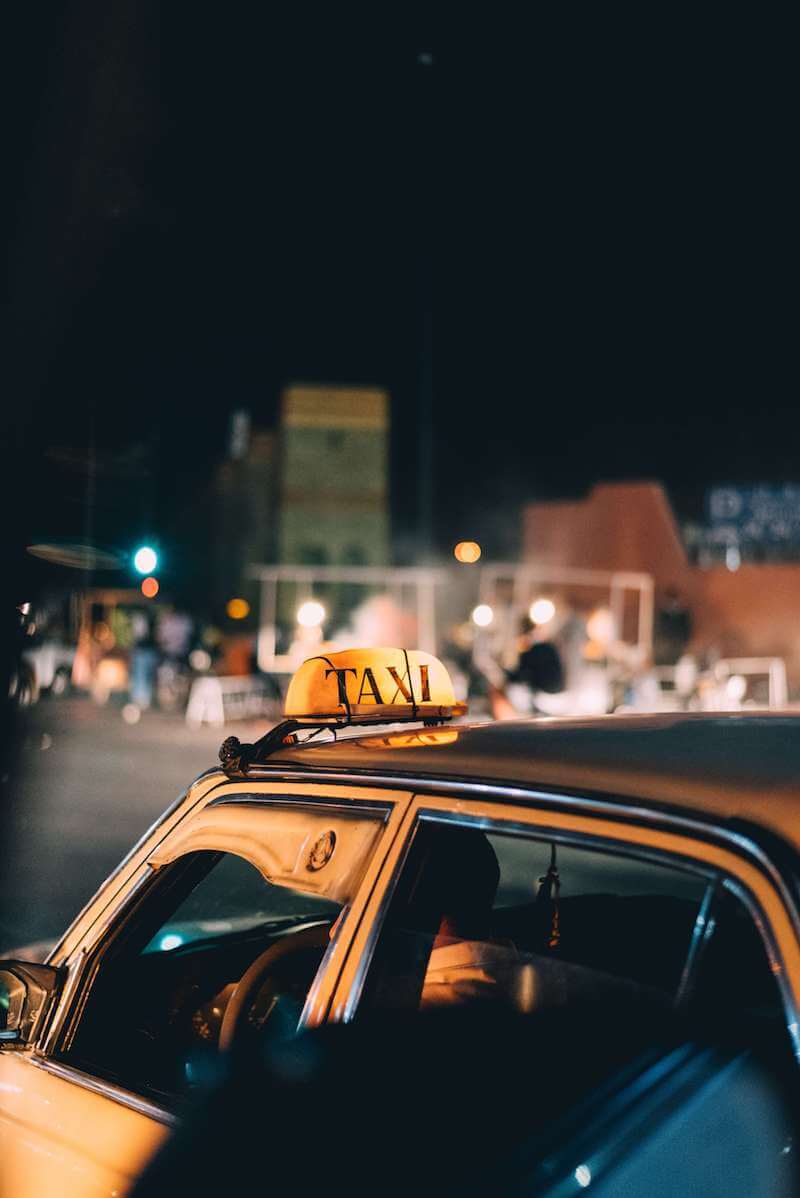
11. Know that the initial price for anything in a market will be inflated
If you plan to do some shopping in the markets around Morocco, remember, every price you are initially given has a…. let’s call it a “foreigner’s tax”, AKA a hyper-inflated price they think you might pay because you’re a rich foreigner.
I feel a little torn about this. On one hand, I hate getting ripped off just because they know I’m from abroad.
On the other hand, I get that they’re just trying to run a business and make money. Relatively speaking, I do earn more than the average Moroccan, and so if I am able and willing to pay a certain price for my pretty scarf, why not pay a little extra?
Anyways, no matter where you stand on this issue, just know that the first price they give you is VERY high, maybe 7x higher than what they’re willing to sell for (really!) and it’s pretty expected that you haggle down.
There aren’t really any shops in the markets that are 100% unique anyway, so if you don’t like the price, you can just move on and that bag, scarf, etc. will probably be available elsewhere.
To test out how inflated the price is, just start walking away, they’ll begin to lower the price immediately.
You might also consider booking a private city guide to show you around on the first day so you can get insider info on appropriate prices, haggling strategies, etc. Click here to check out some highly rated options.
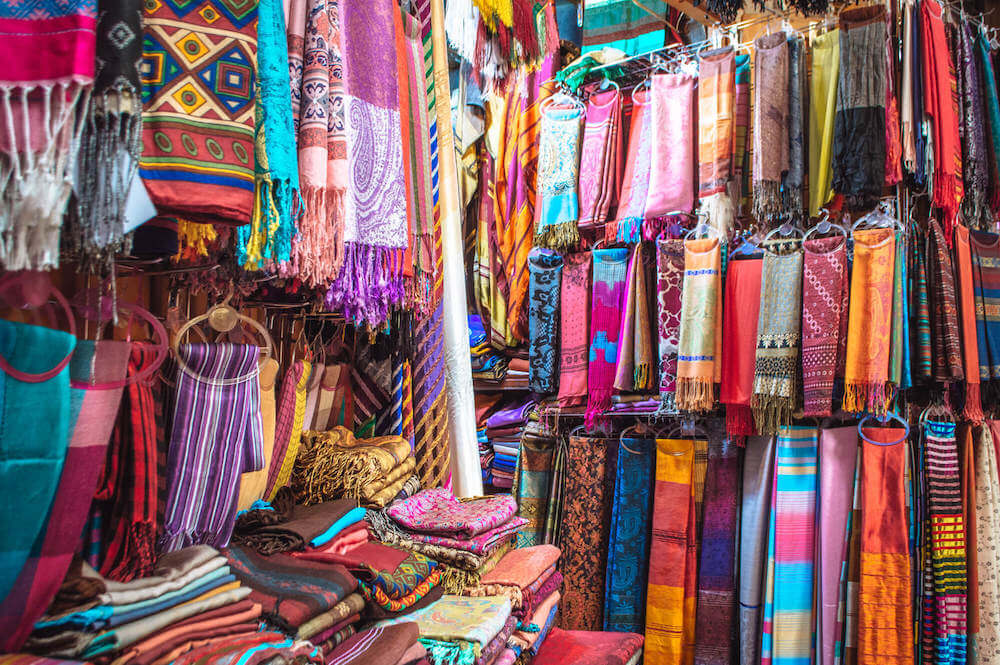
12. Be wary of entering small stalls
This sounds weird but I’m referring to the little stalls in the market that you can step into to look at bags, shoes, etc.
On two occasions, I’ve basically been “blocked” by the shopkeeper from leaving because the stall was so tiny. They never touched me or got physical but it was pretty intimidating.
13. Be careful around the stray cats
One of the very sad things about travelling around Morocco is the abundance of stray cats. It makes me really sad to see these kitties just roaming the streets and trust me, they’re everywhere.
That said, do not touch these cats – they may be cute but they potentially carry diseases. In extremely rare cases, you might even get bitten and contract rabies, as one tourist fatally did last year.
14. Be mindful of double pricing
This is kind of a niche tip, but if you love fresh juice as much as I do, you’re probably going to get drawn in by the MANY delicious fruit juice stands around the country.
I just want to warn you that the advertised price that they plaster everywhere (usually it’s very cheap) can often be for a “dine-in” price rather than takeaway.
As in, if you want to take it away in a cup and straw, you’ll pay extra. The small price is only for those who take a glass and drink it on the spot.
This is a little sneaky because sometimes they’ll automatically give it to you in the takeaway cup and straw, then just give you the higher price even though all the signs say one price.
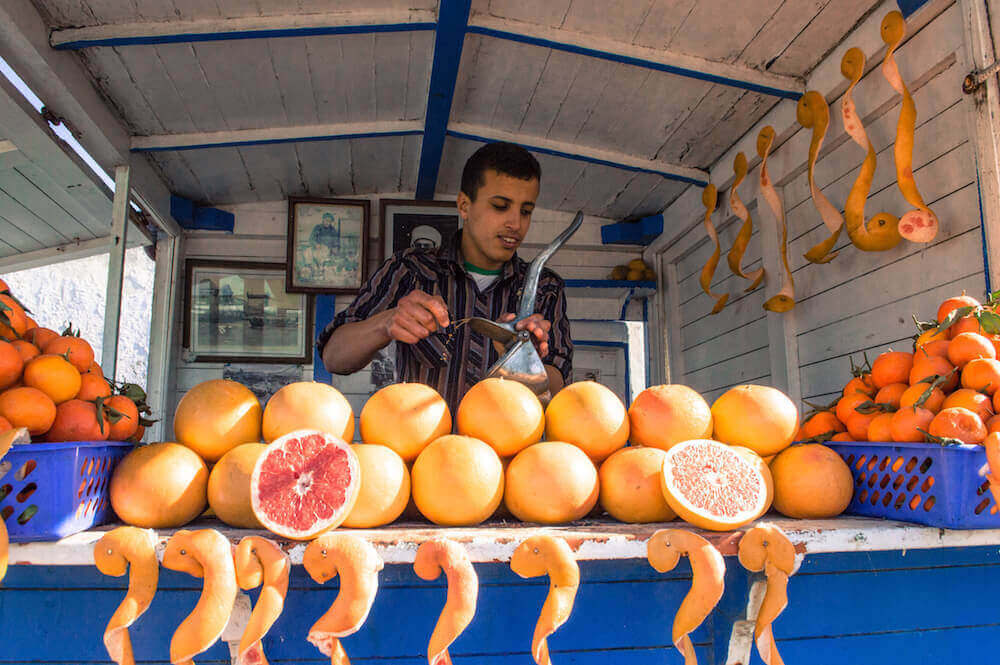
A final note on booze and drugs
Alcohol in Morocco isn’t tough to come by (most hotels will have it, and select bars) but it’s really not that commonly consumed. If you want to have a few drinks during your vacation, go for it!
That said, know that getting too drunk (and roaming about) will probably put you at risk of things like pickpocketing or just falling for the scams we’ve chatted about.
Drugs are a different story. If you’re backpacking through Morocco, odds are at some point you’ll be offered hashish (AKA kif), which is like marijuana. While smoking hashish is often done among locals (and is actually seen as an incentive for some backpackers to visit), it is technically illegal, so remember that.
While I’ve not witnessed this happening, I’ve heard of scams where undercover “cops” try to sell foreigners hashish then get a bribe from you to cover up your crimes… I’ve also heard anecdotes of tourists who were caught and then sent to prison (you can get up to TEN YEARS for it!)
So…. what I’m saying is: buying drugs in Morocco is NOT a great idea.
Morocco Tourist Safety: Moroccan Scams to Watch Out For
Okay, so with all those Morocco safety tips out of the way, let’s tackle some common Moroccan scams.
Again, when it comes to travel safety in Morocco, the #1 thing that you should be wary of is the abundance of scams that are out there so that you can avoid them. If you successfully dodge the following, I promise you’ll have an amazing time:
1. Bad & deceptive tours
I’m listing this as #1 because it can literally ruin your vacation.
I’ve never had this experience as I don’t book that many tours, but several friends of mine have booked tours to go camel riding or do an overnight in the Sahara, only to find super rude guides, deceptive itineraries, and overall just really terrible experiences that left them feeling cheated and disappointed because they were such huge bucket list items for them.
My friend Yishyene describes her terrible experience with “Marrakech Desert Expeditions” in this Instagram highlight here.
While I sadly don’t have any tours I personally recommend, a few tips for booking a reliable tour would be…
Read reviews. As many as you can. This will give you a starting point. My rule of thumb is if I read even one very negative experience, I’ll avoid it. Browsing on a trustworthy platform like GetYourGuide is a good idea because you can check out reviews and a lot of tours at once. Click here to compare tours and reviews.
Get first-hand recommendations from friends. If you know someone who did the experience you’re interested in, ask them. This is the best way to get first-hand honest information.
Read detailed reviews from travel bloggers. Haha, I know easy to say coming from a travel blogger 😉 But of course blog posts are MUCH more detailed than reviews on Tripadvisor, and also they aren’t as easily manipulated as other platforms (fake reviews can be purchased easily, FYI). Remember to also read the COMMENTS of said blog post, because this is where others might chime in with their experiences too.
2. The “place is closed” scam
This is a very common scam. If you hear the words “___ is closed”, run for the hills – these guys are trying to lull you into insecurity so they can guide you somewhere else.
The most innocent variation of this is they actually bring you back to your riad or hotel then demand a (big) tip for their services, but they might also take you to their friend’s business and attempt to coerce you into buying something.
This almost happened to be in Marrakesh – a group of us were walking to the Jardin Marjorelle and this random guy insisted that it was closed and that he would take us to a better “local” spot that wasn’t known amongst tourists.
As soon as he turned into a sketchy alley we knew we had to leave.
3. The fake guide scam
Similar to the above, many of the most touristy places in Morocco are filled with fake, unlicensed guides who will want to help show you around.
This can be as innocent as a young boy asking if you’re lost then helping you find your way to your riad, then demanding a tip at the end, or it can be more sophisticated – guys who actually look like they could be tour guides claiming you need a guide to access certain areas, like the Fes tannery.
The best way to avoid these guys is to just ignore them and keep walking.
Any kind of contact (even just a no) will usually get them to follow you for a while, which can be a bit uncomfortable.
Unfortunately, I’ve found that locals approaching YOU in English are very rarely trying to help you out of the goodness of their hearts, and are inevitably expecting a little tip at the end for their services.
If you do need directions, try asking someone who is tethered to their location (e.g. a shopkeeper) because asking a random on the street might turn into them “guiding” you to your destination, which (as you might have guessed) costs $$$.
4. The henna bait and switch
This happened to a friend of mine on my first trip to Morocco, near the Jemma el-Fnna in Marrakesh.
A friend of mine was walking around the square when a woman waved her over for henna. While she wasn’t particularly interested, the woman was giving a very very cheap price, so my friend caved.
5 minutes later, this woman had doodled a ridiculously elaborate henna design on my friend’s arm, sprinkled it with glitter, and then demanded a new price that was like 10x what she had originally said.
When we called her out, she said the small price was for a basic simple design (which she pointed out in her design book) and that my friend got the works, glitter and all so it would be more expensive.
My friend was pissed and paid her maybe half of what she asked then stormed off.
Weirdly enough, my friend then got an allergic reaction to the henna (she said it felt like burning) and rubbed it all off after 15 minutes anyway.
Moral of the story: don’t trust the henna ladies! Unless you’re actually interested in getting henna done, don’t let them lure you in with a cheap price because it’s likely a scam.
Another variation of this common Moroccan scam is (if you get too close) some of the henna women will pretend like they accidentally got a bit of henna on your hand, then they’ll offer to fix it and give you a full design “for free”. As you can expect, this won’t actually be free in the end and you can expect for them to demand payment.
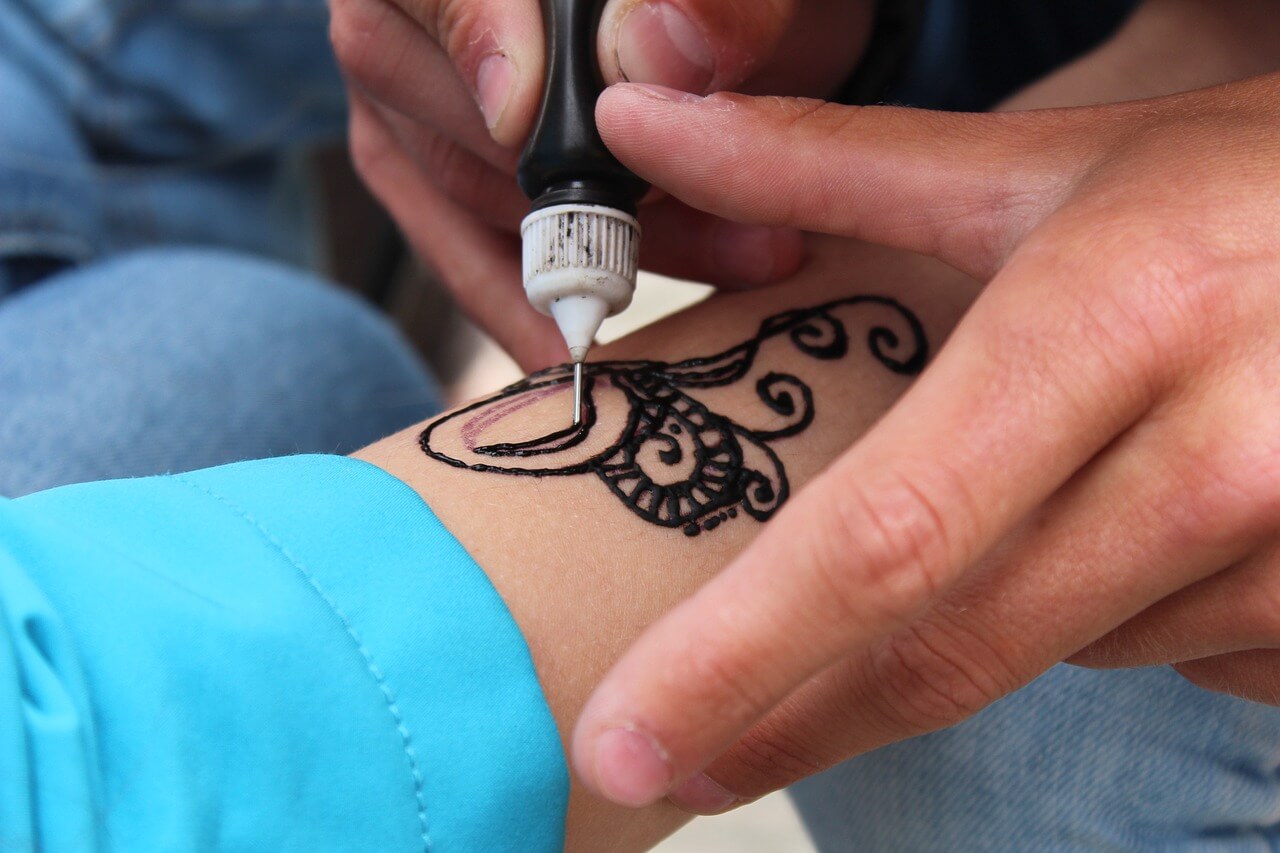
5. The menu bait and switch
I haven’t had this personally happen, but there are some restaurants who apparently have a “cheap” menu at the door to get you inside, then when you go to pay, there’s a new menu with inflated prices.
Another related restaurant scam is sometimes they’ll start bringing you random things you didn’t order, and while unassuming tourists might assume they’re just freebies on the house, they end up charging you for it.
I only had this happen once and it was very small – I think they charged me for bread I didn’t order and the amount was so negligible I couldn’t be too angry. They even showed me on the menu that bread was on there. Just be wary of this!
MY TIP: Always check up on reviews before you eat at a place. People will usually be veryyyy vocal and happy to leave a review if they’ve ever been ripped off.
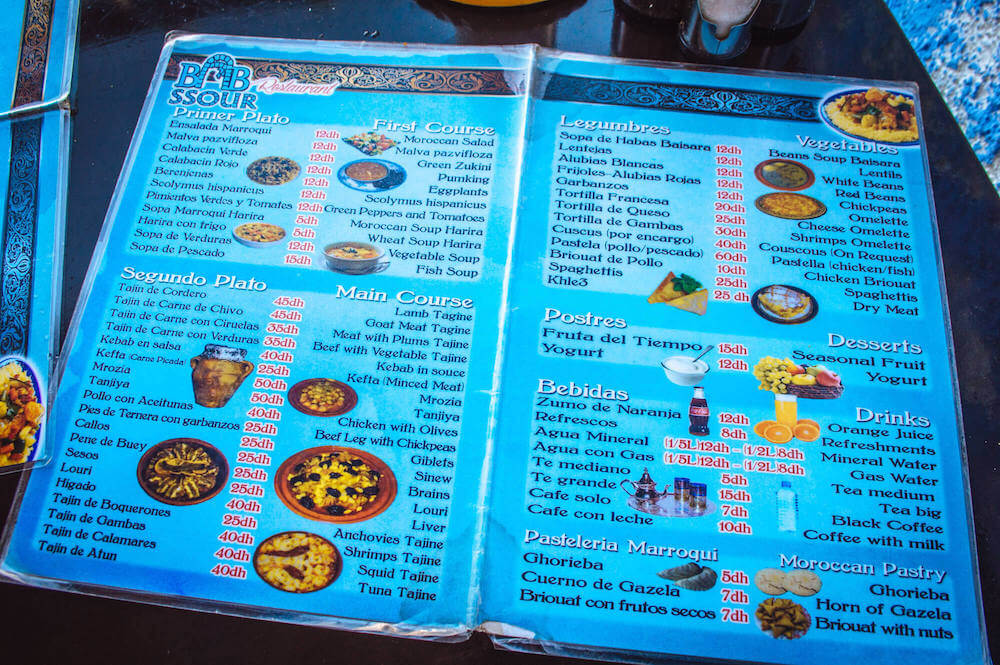
6. The photo opp scam
Another common scam in Morocco is the photo opp scam.
Although, to be fair, it’s not exactly a scam, it’s more like an unexpected ‘paid attraction’ of sorts.
Basically, you should know that any “super special” photo opp involving elaborate costumes or (sadly) animals does not come free. If you want a photo, then you should expect to pay something.
A good rule of thumb to follow is if someone is beckoning you over for a photo, odds are they will demand money after.
In Jemma el-Fnna Square for example, there are lots of guys with poor monkeys that they’ll want you to take photos with, and also snake charmers and guys holding big snakes too.
If you want a photo, that’s your perogative, but know that they’ll be demanding some dough for it afterwards…!
NOTE: If you hand over your phone to one of the guys to snap the photo for you, odds are good that they won’t return the phone until you give them the amount of money they’re asking for. Just FYI.
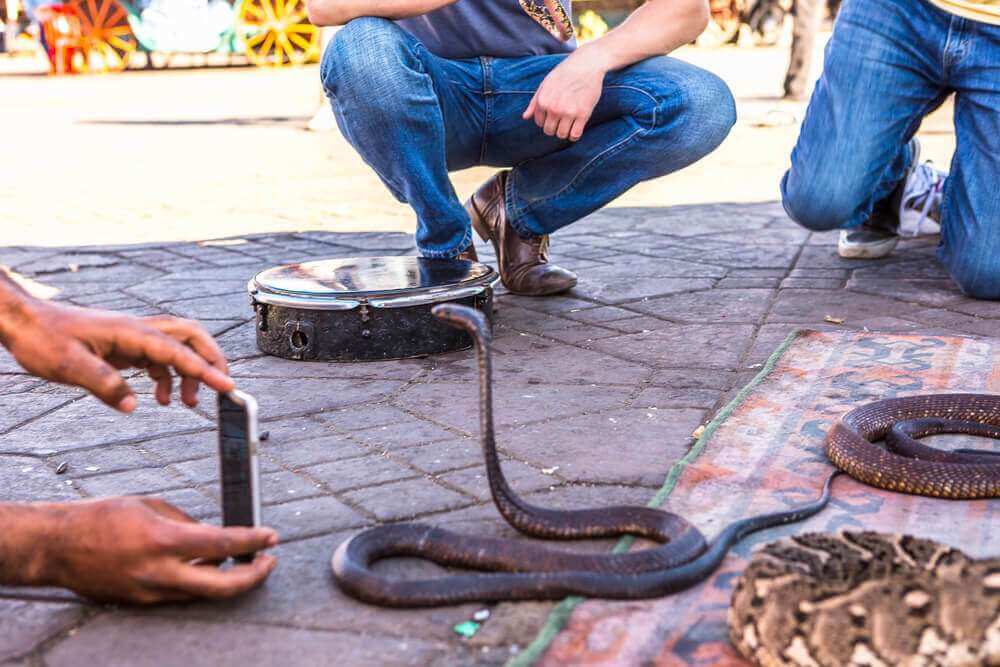
7. The paid toilet scam
Public washrooms in Morocco are free.
That said, some opportunists will linger around these toilets and ask for money, assuming that you, a silly tourist, won’t realize it’s not needed. This won’t cost you much, but just something to be mindful of – you are under no obligation to pay for public toilets.
SIDE NOTE: There is often no toilet paper in public toilets, so make sure you have a packet of tissue on you. If there’s an old lady selling tissues outside, she’s not a scammer, just a smart little hustler. I’m always happy to give the toilet paper ladies money – they’re usually super nice.
8. The fake/poor quality goods scam
I’ll be honest with you: the stuff in Morocco is gorgeous to gawk at, but for many of the goods, the quality isn’t spectacular and (sadly) many are mass-produced.
For example, my boyfriend bought a leather bag that he has never ever used because to this day, 2 years after our trip, it still smells like pigeon crap.
Also, two beautiful ceramic bowls I bought chipped immediately and cut me while I was trying to use them for the first time.
And while that’s not really scammy (just something to be mindful of), there is a darker (less common) scam I’ve heard of, where a shopkeeper might sell you on something expensive, like a rug, and then distract you when it’s being packed up so they can ultimately hand you a swapped product of inferior quality.
Beware of that, and don’t let your guard down after you’ve paid.
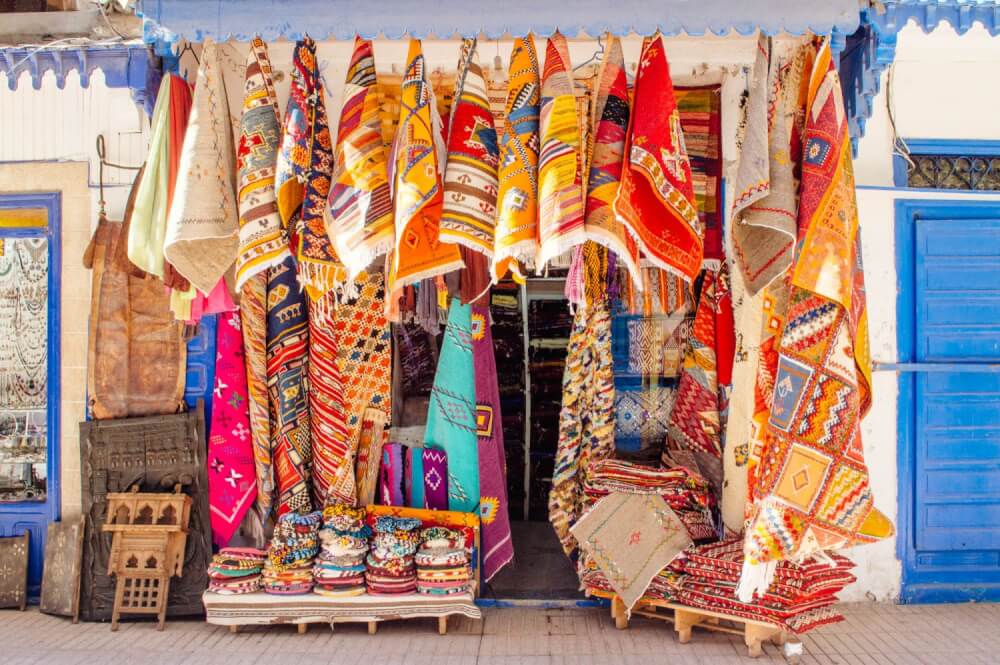
9. The local love scam
Last but not least, I’ve heard so many sad stories of women getting tricked by local men, even tour guides they’ve met, to thinking they had fallen in love, only to get scammed out of lots of money.
The pattern is usually they’ll convince the woman they’re in love, get the woman to pay for gifts, for hotels, for rent, even to wire them money to help their families, only to ghost them or break up with them when they’ve gotten enough.
This is heartbreaking for obvious reasons, but especially because these guys are SO good at it.
Many women report feeling like it was the real deal, even living with their scammers for long periods of time, meeting their families, etc. when in reality they were playing several women at the same time.
NOTE: This isn’t to say that finding local love in Morocco is impossible… my favourite blog about Morocco is Maroc Mama who fell in love, got married and moved to Morocco for a local man! She’s doing great! But if you think something might be too good to be true, trust your gut and do some research online. If your relationship matches any of the patterns mentioned by other women, then you should be careful.
For men as well, this is a scam that I’ve heard happening a lot online – local women who solicit them online and ask for money transfers, beckoning them to visit and bring gifts, etc. Just something to be wary of…
What about solo female travel in Morocco?
In my honest opinion, I wouldn’t recommend solo female travel in Morocco, particularly if you want to explore solo by yourself, without the company of new friends or a guide.
Morocco as a solo female traveller would be a challenge, for sure.
As I’ve mentioned before, catcalling and street harassment is very common in big cities.
There are a lot of causes to this issue, a few being that Morocco has more rigid and traditional gender roles, and as a whole it’s more of a patriarchal society, but also I’ve heard it’s because for a lot of Moroccan men, their perception of Western women is limited to what they see in things like porn, so they perceive foreign women as more sexually open and scandalous… regardless of what they’re wearing.
It’s a big, complicated and messy issue, but the end result remains the same: travelling around Morocco as a woman means you’ll inevitably get catcalled and in some extreme cases, followed or sexually harassed physically.
But hey, if you’re interested in visiting Morocco as a solo female traveler, it’s definitely not impossible.
I’ve met many women who have done it. I would suggest trying to make friends on the road and keeping solo explorations to a minimum, but you shouldn’t let being solo stop you from experiencing this beautiful country.
I do think that this would not be a place for a beginner solo female traveler, and certainly not if you lack the thick skin it takes to ward off aggressive “suitors”.
In addition to the many tips above, I’ll add that to ward off unwanted advances, you should wear a ring on your ring finger and mention your husband a lot.
Moroccan men do not really respond to things like “boyfriend” or “fiancee”, HUSBAND seems to be the keyword.
Even if you don’t have a husband or if he’s not there, mention him and pretend like he’s nearby.
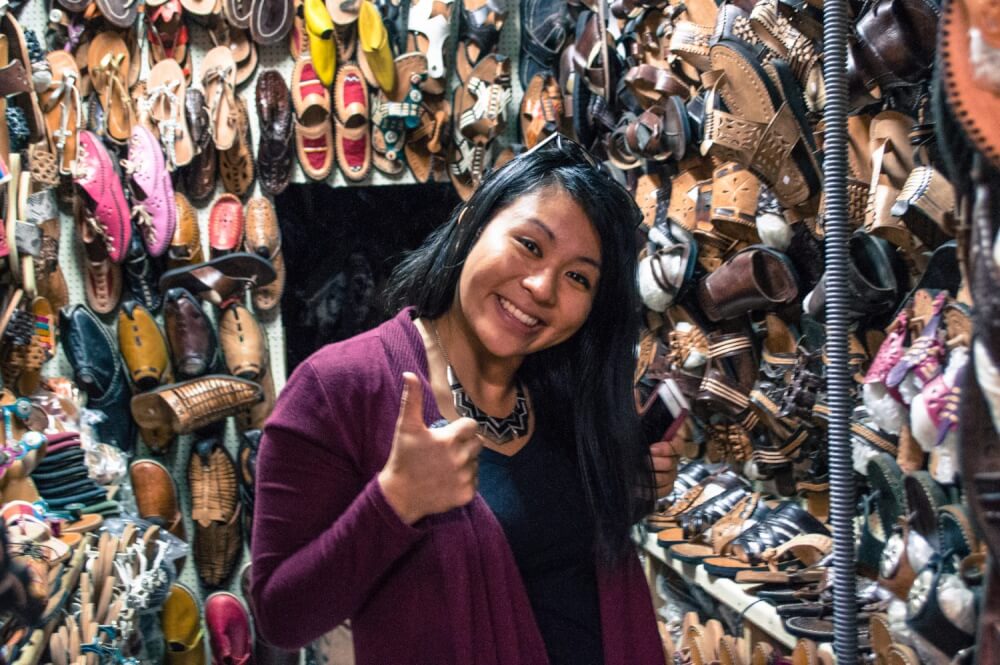
A final note on the safety of Morocco
Remember, everything in this article comes from my own personal experience and can’t necessarily be generalized to every single person and experience.
I visited primarily the very touristy cities that have had tourism for years – and as a young female I was more at risk for certain types of aggression (e.g. catcalling and verbal harassment) while I was less of a target for others (e.g. violent crime, muggings, etc.)
And while scams suck and nobody likes to be swindled, I have to remind you that it happens to everyone and you shouldn’t let them ruin your vacation.
Morocco really is a beautiful country – the landscapes are unreal, the architecture is beautiful and the food is delicious. Hospitality here (when it’s genuine and not scammy) is unmatched.
I strongly urge you to come here prepared (with all these Morocco safety tips in mind), but if something negative does happen, don’t let it taint your experience!
At the end of the day, even when you get scammed, often the amount is negligible compared to how much you’d pay somewhere else to travel.
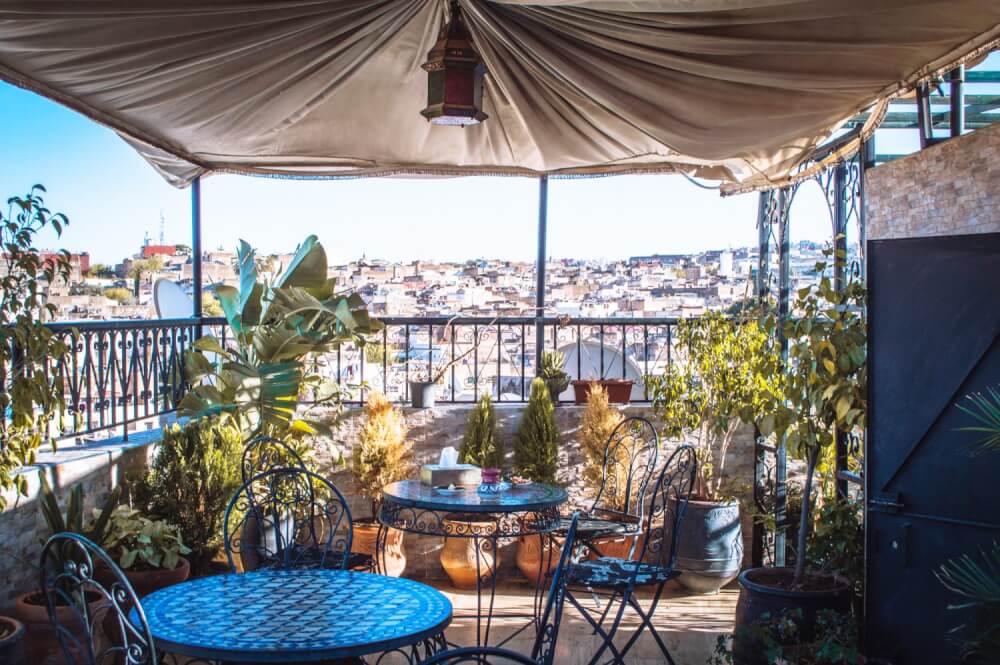
Any other questions about Morocco, safety, and travel?
Remember: when travelling in Morocco, safety comes first! Let me know if you have any more questions about safety for tourists in Morocco, or about travelling to Morocco in general. Have a safe trip 🙂

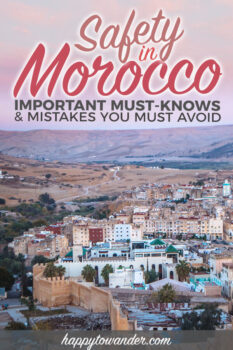

Whoa, this is such a thorough guide, Christina! It literally addresses all my doubts about traveling in Morocco as a female traveler. And it’s timely: I’m planning now my trip to Marrakesh, Fes, and Chefchaouen during fall (I think the weather will be cooler then).
Bookmarking it!!
This is a great article. I’m traveling to Morocco this summer and knowing what to be aware of really helps. Thank you for sharing!
With the amount of scams and safety issues out there, my husband and I were thinking of taking tours in Morocco. We will be booking them online via Get your guide or something similar. The paper toilet bit reminds me of Cuba. Tons of great information here – thank you for sharing. We are heading there in August – cant wait!
This is an amazing detailed post. I have wanted to visit Morocco for some time now. I’ll be honest in saying that reading this gave me a bit more nerves about the trip than I initially had. However, it also does make me feel more informed and a little wiser. Thanks!
Found you on BPS at FTB and am now a new follower of your blog!
Goodness what an excellent and thorough post! I wish I had seen this before we visited Morocco a few years ago!!
We were scammed a couple of times. The worst one was the henna lady. I kept telling her I didn’t want any henna, as I have really sensitive skin… But she grabbed my arm and wouldn’t let go. I struggled with her for a while so she couldn’t do much, but she still demanded a huge price $60 for a tiny bit of henna that I’d repeatedly said I didn’t want. I was so pissed off, but in the end I paid her something to let go of my arm!
I loved the Atlas mountains and the smaller villages, but I was not a fan of Moroccan larger cities. I’m just not keen on the constant scam worry when I’m on holiday! Its one of those places that isn’t right for everyone…
Having just returned from Morocco, I couldn’t agree more. Some awesome tips in here that are right on the money!
I agree. Morocco can be a trying experience and you need thick skin to survive it. I went to Morocco by myself and spent days walking the souqs alone. As a solo female traveler, I will say that Marrakesh was the hardest place to handle. But, like you say, look like you know where you’re going, say no in Arabic and with a smile, and the harassment goes way down. I found other cities in Morocco much easier to wonder alone in.
I’m going on a tour in Morocco in a couple of weeks, so this is very timely! Another tip I’ve heard for women who are out and about on their own is to wear a headscarf so you don’t stand out so much. I’ll definitely be packing a scarf! But otherwise I’m really excited to finally visit!
Morocco looks amazing. Thanks for sharing your experience. I don’t feel so nervous about visiting now.
SIGH. We spent three weeks in Morocco and never felt unsafe, but WHY WHY WHY of all the countries do shady people have to make traveling there such an unpleasant experience for tourists? We felt pretty much the whole time like the locals had zero interest in us beyond our wallets. Everyone was out to cheat and scam us. WHY?
In the course of a year we visited more than a dozen other countries and basically everyone else all over the world was so much more pleasant and less interested in scamming us. I have a really hard time recommending Morocco to other travelers because, while there’s plenty of cool and interesting stuff to do there, the unethical culture toward visitors is just sorely disappointing and unnecessary. We probably would have spent more money in the country if we’d felt less taken advantage of.
Wow! This is so eye-opening! Everyone should read this before visiting Morocco. I thought I knew about some of the scams and safety tips, but you really opened my eyes to several more! I still want to go, but I’m so glad I read your post!
I went to Morocco years ago (before it exploded as a destination on instagram) with a gay male friend and we had such a bizarre array of safety experiences (we explored some separately and some together). I actually felt safer as a solo woman than with my friend (everyone presumed we were a couple) — yes there was catcalling, but local women were also way more open toward me. When I was with my friend we had a few just strange experiences, most notably on the beach in Tangier when a local guy hung out with us all afternoon, ignored several attempts we made to get him to leave, asked us all kinds of super weird and invasive questions (like “how much money do you have?”), and then invited us to a “party” with his friends. When we left we expected him to follow us, but he totally left us alone. I’m honestly not sure if he was sketchy or just super friendly. We also got into trouble with a pretty aggressive guy who tried to rob us in a quiet alley in Marrakech — he shoved my friend up against a wall and physically threatened him when we said we had no money (which happened to be true — we had literally zero cash and no atm cards between the two of us). Overall we had some great experiences in Morocco but it’s definitely not a place I’m dying to go back to.
This is a great, detailed article. I went to Morocco last year on a field trip for university and we definitely got caught out by some scams. Two guys ended up paying the equivalent of £10 for a tube of Pringles and some LIDL nuts in a little shop we went to – that’s the tourist price for you. My boyfriend and I definitely got caught out at one of the food stalls in Marrakesh when they just started bring us lots and lots of food – I advise being very specific in what you want and checking the price before they bring it out.
Steer well clear of the people with monkeys on leashes – a few times they tried to put them on the shoulders of some of group when we weren’t even paying attention to them.
All of that said, Morocco is a beautiful country, it was great to explore something completely different, and I felt very safe most of the time (the only time we didn’t was when we accidentally ended up in the tanning district trying to follow Google Maps to somewhere and it was clear we were the only tourists there).
This is an amazing guide! My husband (boyfriend at the time) and I went to Marrakech a few years ago, and I was totally overwhelmed by much of what you’ve said above (also, a lot of culture shock). Ultimately, we figured these things out and ended up loving the city, but it’s so important to look past those barriers! Can’t wait to read more of your stuff!
Wonderful photos and very useful. This place looks so exciting makes me want to go and walk around city ❤️❤️
Christina, thank you for featuring my blog and my perspective of a traveling black woman in Morocco! I 1000% agree with the points you made in your article. I hope that people read this to stay informed and take that wisdom with them as they travel to Morocco and perhaps other places around the world that may seem a bit sketchy or scary from a media/tv angle. Happy traveling!
Hello .thank you for this insight.my daughter is on honeymoon there at the min…while it has put my mind at ease a bit .its opened a lot more questions I get the feeling if they think you have not read the guidelines on THERE country then its our own fault. Luckly my daughter read what I could find on the place..but to me a holiday somewhere so beautiful like marroco why hide it behind a wall and call it a complex. She has been told its at there own risk if they want to leave the complex .the son in law has just informed me they was asked if they wanted to buy HASHISH yesterday.thank goodness due to them not having a clue what it was they sad no.I’ve just told them what your arrival said shocked is an understatement for them both.
Thank you for your blunt honest
Lisa ( a worried mum)
I’ve just returned from traveling throughout Morocco. I referred to your posts many times before and during our trip. I agree with everything you’ve written above. We definitely felt the least safe in Marrakech. After a very close call with a pickpocketer (his hand was literally in my front pants pocket) we decided that if one of us needed to use our phone or wallet, we’d huddle together. We also found it useful to ask our Airbnb host lots of questions, like what’s a fair price for the taxi? Where is a safe place to change money? etc. Airbnb was great because it gave us local contacts.
Be mindful while traveling with luggage- someone tried to steal our luggage from the trunk of our parked taxi while we paid our driver.
All that said, I’d go back because the pros definitely outweighed the cons.
My family and I will be going to Morocco very soon, so I am glad I came across this particular article. This article was very helpful and had great details about what scams are present and how to deal with them. I am very much so looking forward to visiting Morocco, and now I am much more well informed. Thanks!